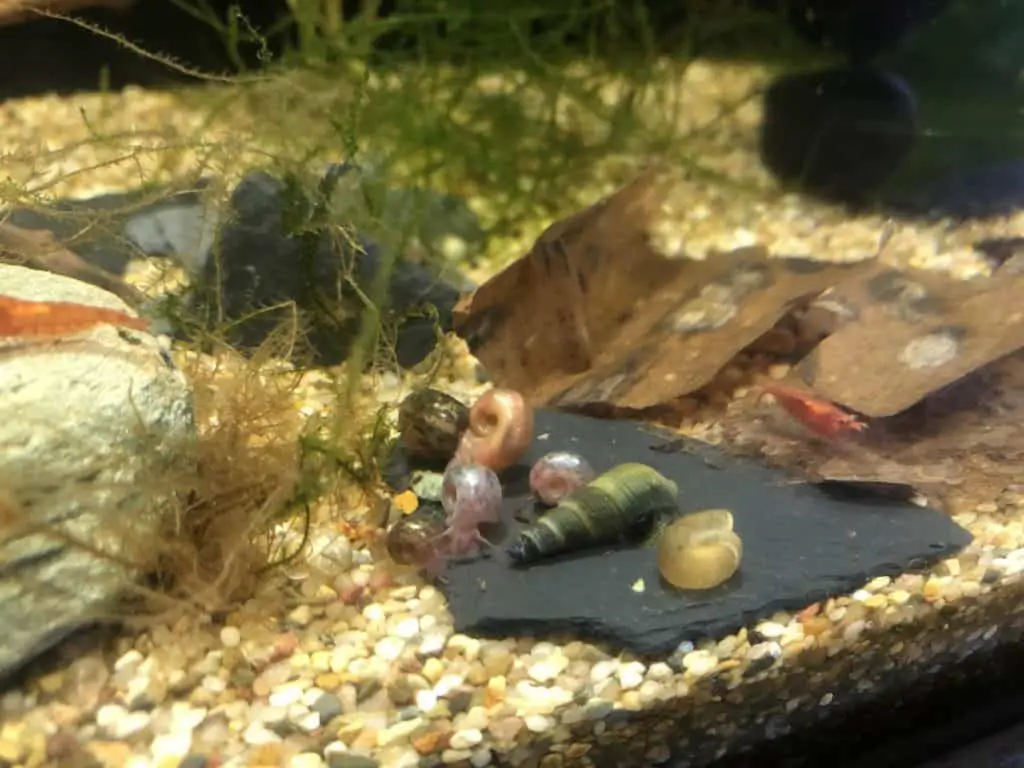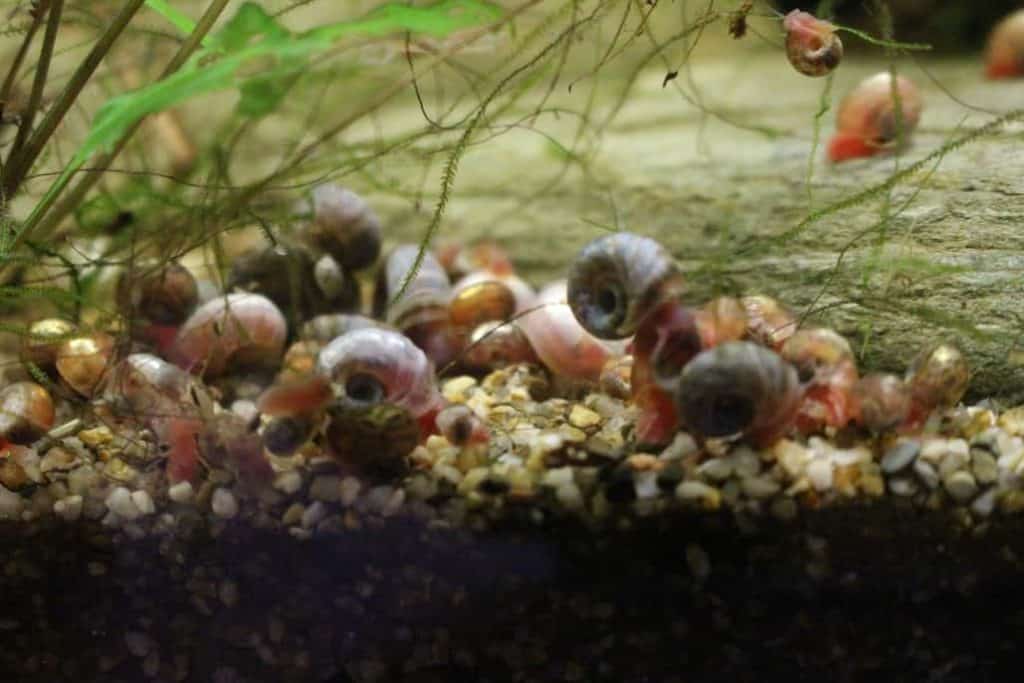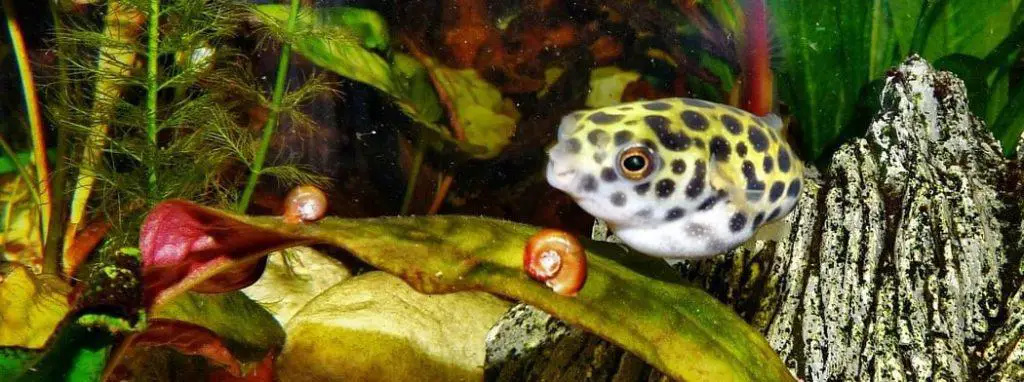Are you considering adding dwarf puffers to your aquarium but are worried about how they will get along with your snails? As an aquarist, knowing what kinds of animals can live together in harmony is essential. In this article, we’ll be exploring the question: do dwarf puffers eat snails?
Dwarf Puffers do eat snails. Small and voracious predators feed on small snails and other invertebrates. As with all fish, snails should only be fed to Dwarf Puffers in moderation as part of a balanced diet.
For those unfamiliar with these fish, dwarf pufferfish (Carinotetraodon travancoricus) are small freshwater creatures native to India and Sri Lanka. They’re popular for their vibrant colors, active personalities, and intelligence. No wonder many people want them as part of their home aquarium! But before diving into whether or not they’ll snack on any nearby snails, let’s take a closer look at the diet of these fascinating little critters.
Puffers have hearty appetites that must be satisfied regularly; otherwise, they become listless and stressed. A balanced diet consists of plant-based foods like algae wafers and high-protein ingredients like bloodworms or shrimp pellets. To top it off, some aquarists add snails as a supplemental treat—but is this wise if one already has a population living in the tank? With all this said, let us now address our main topic: do dwarf puffers eat snails?
Overview Of Dwarf Puffer Fish
Dwarf puffers are a popular choice for freshwater aquariums, as they make great tankmates and require very specific water parameters. They’re known to be small in size but big in personality. Pufferfish have unique characteristics that differentiate them from other fish species; their mouth is shaped like an “O,” which serves the purpose of eating live food such as larvae or worms. They also have spines around their body that can become erect when threatened. As they age, they may develop intricate patterns along their bodies, making them even more visually attractive to hobbyists.
In addition to being interesting creatures with fun personalities, dwarf puffer fish provide many benefits, including natural algae control and helping maintain clean tanks by “polishing” surfaces. They can easily adapt to new environments and thrive under proper care—a perfect pet for any passionate aquarist!

Feeding Habits Of Dwarf Puffer Fish
Dwarf puffer fish is a fantastic tropical species that make great additions to any aquarium. Their unique diets and feeding habits make them an interesting addition to the home tank. It’s important for anyone considering adding a dwarf puffer to their tank to understand these dietary needs to ensure proper nutrition and health.
Regarding the diet of a dwarf puffer, there are three main categories: live prey items, frozen food, and prepared foods.
- Live Prey Items: These include small crustaceans such as shrimp, bloodworms, daphnia, and snails. Dwarf puffers love snails! They will eat them enthusiastically if available in your local pet store or online retailer.
- Frozen Food: This includes freeze-dried krill, plankton cubes, worms & insect larvae (e.g., brine shrimp). Ensure you always thaw frozen food before giving it to your pufferfish so they can easily digest it without choking on it.
- Prepared Foods: There is also commercially prepared food specifically formulated for puffers available at most pet stores or online retailers. The best type of prepared food contains high-quality proteins like shrimp meal, squid meal, and other seafood sources, along with essential vitamins and minerals needed for growth and development.
It’s also very important for hobbyists who keep dwarf puffers to provide variety in their diets by rotating different types of live/frozen/prepared foods throughout the week. Not only does this practice help prevent nutritional deficiencies from occurring, but it also helps promote natural feeding behaviors because each item has distinct smells, which entice the puffer fish into eating them more readily than when presented with just one type of food all the time. So remember – feed your little buddies some diversity!

Invertebrates In A Dwarf Puffer Fish Diet
The Dwarf Puffer is an interesting fish that can be kept in a home aquarium. While they may not eat snails, these omnivorous puffers will happily take advantage of any invertebrate foods. Invertebrates are critical for their diet as part of providing a balanced and nutritious diet for your puffer fish.
Invertebrates provide essential amino acids, fatty acids, minerals, vitamins, and other nutrients that dwarf puffers need to remain healthy. A varied selection of small aquatic life, such as worms or crustaceans, should make up the majority of their food intake each day. To help ensure optimal health, here is a table outlining some beneficial invertebrates for a dwarf puffer’s diet:
| Food Type | Nutrients Provided | Serving Suggestions |
|---|---|---|
| Bloodworms | Protein | 1-2 times per week |
| Shrimp | Minerals | 2-3 times per week |
| Krill | Vitamins & Fatty Acids | 3-4 times per week |
| Clams | Calcium & Phosphorus | Once every two weeks |
By offering your dwarf puffer fish a variety of small invertebrates with high nutrient content occasionally, you can significantly improve their overall health and well-being. As always, when feeding any aquatic creature, don’t overfeed and observe closely to prevent digestive issues down the road. With proper care and attention to what goes into its stomach, you’ll have a happy and healthy dwarf puffer!

Alternatives To Snails For Dwarf Puffer Fish
Dwarf puffer fish are known for their love of snails, but they can also enjoy many other foods. Bloodworms and brine shrimp are both favorites among these small fish. They’re packed with nutrients and easy to find in most pet stores. Plankton is another great option for dwarf puffers; it’s a rich source of omega-3 fatty acids, which help keep their immune system healthy. Mosquito larvae and krill are also excellent sources of protein – both provide essential amino acids that the fish need to stay vibrant! So while snails are a popular food choice for dwarf puffers, there’s no shortage of alternatives if you want to mix things up now and then. With all the options available, your little friends will never get bored at mealtime!
Challenges With Feeding Snails To Dwarf Puffer Fish
Yes, dwarf puffers do eat snails. However, some challenges are associated with feeding them just a diet of snails. Fish health is an important consideration when it comes to their diet, and if you’re considering providing your Dwarf Pufferfish with only snails, here are a few things you should be aware of:
- Providing too much of one type of food can lead to dietary deficiencies in the fish. Snails alone cannot provide all the nutrients a Dwarf Puffer needs for optimal health and growth.
- Variety is essential when feeding any species of fish, including Dwarf Puffers. Without sufficient variety in their diet, they will become malnourished over time due to missing out on certain vitamins and minerals found in other foods.
- If fed exclusively on snails over long periods, Dwarf Puffers may develop poor digestion, eventually leading to digestive issues or even death.
To ensure your Dwarf Puffer remains healthy, it’s best to feed them a varied diet that includes snails and other live foods such as worms and brine shrimp. This way, you can ensure your pet gets all the vital nutrients they need while allowing them to enjoy their favorite snack – snails!
Conclusion
Dwarf puffers are an attractive and interesting species of freshwater fish that can make a great addition to any home aquarium. While they have some unique dietary requirements, including the occasional invertebrate, such as snails, it’s essential to be aware of the challenges associated with feeding them this type of food.
You Should only feed your puffers Snails when other food sources aren’t unavailable, or your puffer is mature enough to handle them properly. If not, plenty of alternatives like bloodworms and daphnia provide similar nutritional benefits without introducing any risk factors. Proper care and diet planning allow these captivating little creatures to remain healthy and happy for many years in well-maintained aquariums.

